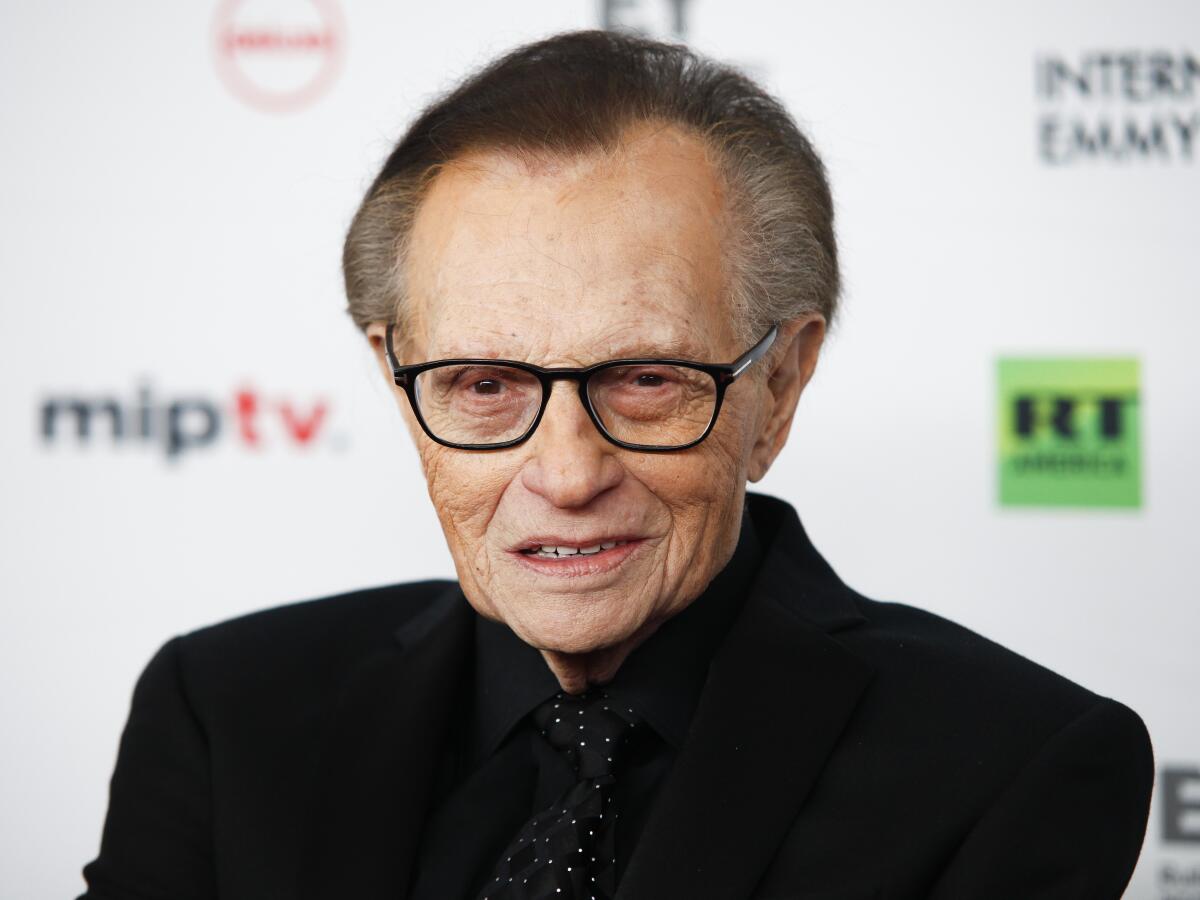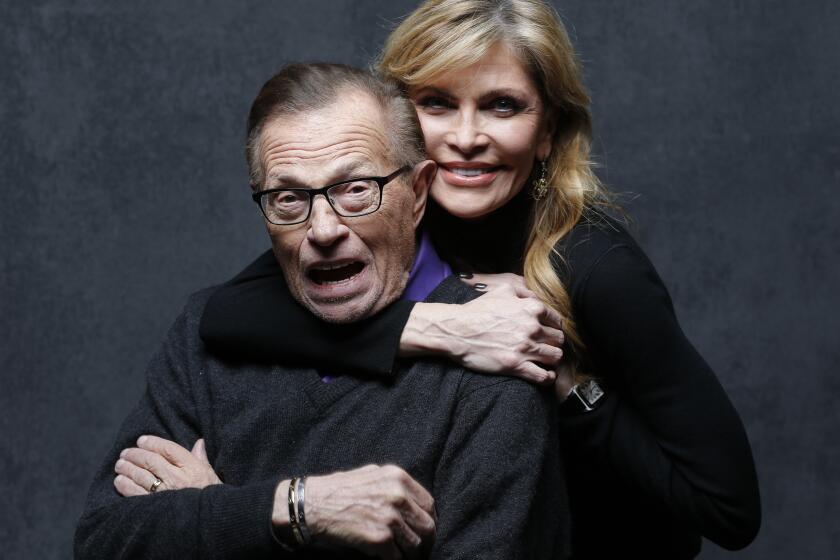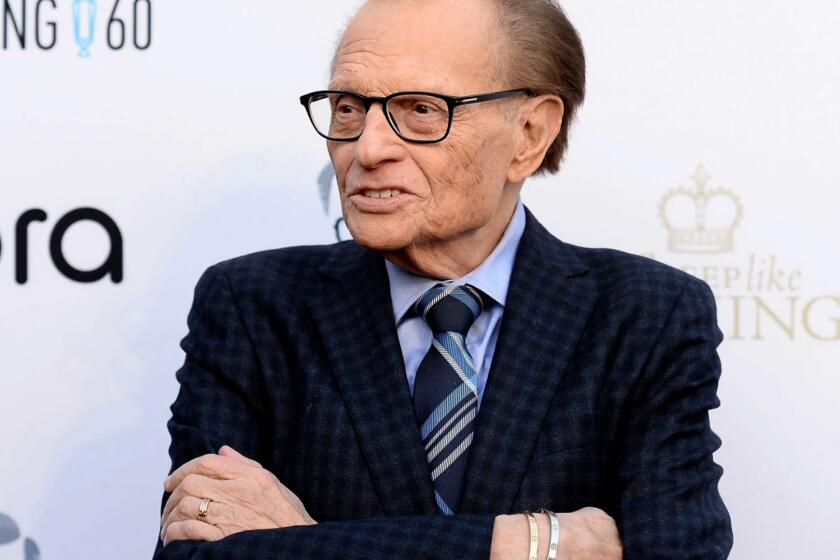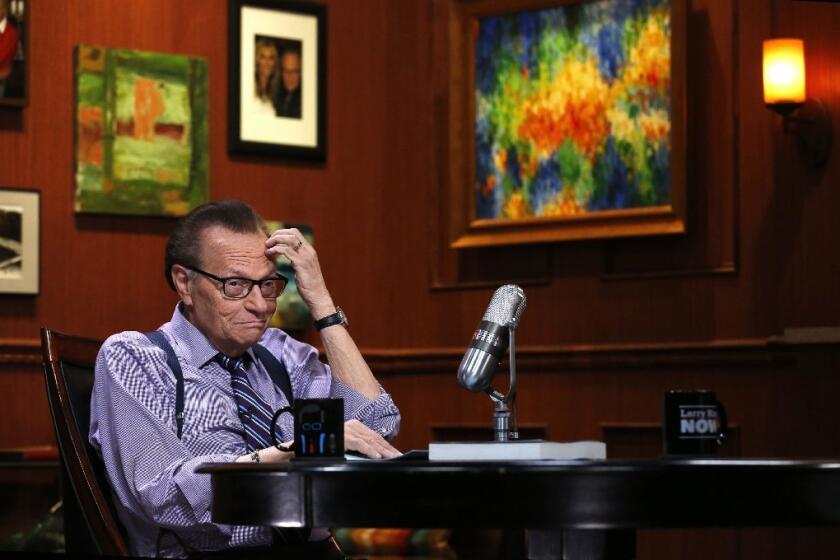Appreciation: Larry King loved ‘dumb’ questions. With them, he helped write cultural history

I became a Larry King fan late — to have become one early I would have needed to listen to him from the cradle — and even in his CNN salad days, when “Larry King Live!” aired nightly over a quarter century, from 1985 to 2010, my attention was usually elsewhere. (I have had cause to watch the old shows since; they constitute an Alexandrian library of cultural history.)
My first sense of the host, who died Saturday at 87, came instead from the old-school newspaper column that appeared in USA Today back around the time the CNN run began, a collection of celebrity news bites and brief observations that in this century found atomized expression in his @kingsthings Twitter feed (and from imitations my friend Steve would do of King taking callers on his TV and/or radio show: “Tampa, Florida, go ahead”).
For the record:
9:38 a.m. Jan. 23, 2021An earlier version of this article reported that Larry King’s newspaper column was syndicated and appeared in the Los Angeles Herald-Examiner. The column ran in USA Today from 1982 until 2001.
When I did tumble to his particular brand of greatness, it was from the web-based “Larry King Now,” which I stumbled upon a couple of years after its 2012 launch, part of a joint venture — Ora Media — between King and Mexican magnate Carlos Slim. (Its several seasons stream on Hulu as well as from its own dedicated site, along with the current affairs companion show, “Politicking With Larry King.”)
Larry King, one of the most famous talk show hosts and opinion shapers in the world, died Saturday in Los Angeles after being hospitalized with COVID-19.
Much of what I love about King’s work — and he had been at it 25 years when “Larry King Live!” began, working on radio out of Miami before moving to Washington, D.C., where he got into television without getting out of radio — is what he did, in conventional terms, “wrong.” He went into interviews with little preparation — sometimes, when he was reading facts about a guest off a note card, it was clear he was seeing it for the first time — but with confidence that something good would come out of it. (If he had a kindred spirit among television interviewers, it was Craig Ferguson, on whose “The Late Late Show” King appeared 20 times, including Ferguson’s final episode; he was as good a guest as he was a host.) “I shun too much preparation,” King said. “I don’t want to know the answer to a question I’m going to ask. I like to be surprised.”
“I ask dumb,” King told me in 2016, when I visited him at his Glendale studio. “When I first started, I was 23 years old, I had a priest on, Catholic priest, and I asked how many children he had. I was dumb. My friend Herbie Cohen, he said, ‘You know the secret of your success? Dumb.’ By ‘dumb,’ he means, ‘Help me. I don’t understand. Why? Why did you do that?’”
It was his gift and his job to be curious, to see the world as an exciting place in which important things were happening all the time and to recognize that even things that weren’t that important might seem so — and by seeming, become so — if framed in the right way, by the right, resonant voice. That range of experience made him liberal in his outlook; an interview could be an opportunity for growth.
Larry King, who gained fame with his CNN show ‘Larry King Live,’ died Saturday in Los Angeles. King was hospitalized with COVID-19 earlier this month.
“A good interview,” King said, “you know more than you do before you start. You should come away with maybe some of your opinions changed. You should certainly come away entertained — an interviewer is also an entertainer. ... When you see an interview show you’re entertained, you’re into it. You pay attention to it. And when you come away, you feel better, you know more.”
Sitting across a desk from the famous and powerful, he was friendly but not fawning, interested but never obsequious. He could drop names as carelessly as country singers drop g’s, and, as the walls of his trophy room attested, he had some big names to drop — though he was devoted to friends from the old neighborhood in Brooklyn he’d meet Saturdays for breakfast at Nate & Al’s. “To them,” he told me, “I’m Larry Zeiger.”(He became Larry King immediately before his first radio broadcast, at the suggestion of the station manager.)
King was bigger than life, a journalist out of an old movie, and he made a lot of cameo appearances on the big and little screens over the years, from “Ghostbusters” to “Murphy Brown” to last year’s “Maxxx,” from O-T Fagbenle. Even his eight marriages (to seven women) seem emblematic of a bygone time. (The last, to Shawn Southwick, lasted 22 years; they separated in 2019.) He was a Dodgers fan when they were both creatures of Brooklyn, and continued ardently in Los Angeles.
Frank Sinatra was his kindred spirit. But he was comfortable too talking with people half, a third or even a fourth his age. (“How To Talk to Anyone, Anytime, Anywhere,” was the title of a 2007 book.) He was not a reporter, exactly, yet his interviews did elicit lots of information, including things that many interviewers would consider too basic to ask, or be afraid to look foolish asking — he wondered why Morrissey’s old band was called the Smiths if his name wasn’t Smith — but which, after all, might produce an interesting response.
He was in no hurry to leave the world; heart attacks, cancer and diabetes failed to have their way with him, although a stroke in February 2019 (not revealed until November), which caused nerve damage in his left foot and put him in a wheelchair, left him considering suicide, he confessed to “Inside Edition” in February of 2020. But he stepped back. And though visibly slower, he was recording pandemic-remote episodes of “Politicking” until just before the November election. In May, it was announced that he had signed a $5-million contract to do a podcast to be called “The Millionth Question,” bringing him back to radio in a way, though that never materialized.
It was inevitable, given a restless, hungry mind, that he would ask questions of the universe as well, which in practice often meant polling his guests about whatever was on his mind. It was not uncommon, in later years, for him to ask his peers or his seniors what they thought about dying, something he told William Shatner he thought about “all the time.” What did they think happened afterward? Were they afraid? That he was not himself religious and could not bring himself to believe in an afterlife — he did consider having himself frozen until such time as he could be safely reanimated and brought back to health — did not quite settle his mind.
“I can’t make that leap,” he said in 2016. “Maybe my brain gets in the way. Or maybe I’ve interviewed too many religious leaders that I never got answers [from]. And I’m a person who lives on answers.
“Everyone says you need something to believe in,” King continued. “I don’t. One thing I like about the Jewish philosophy, the Reform Jew at least, says, ‘Maybe there’s a God, maybe there isn’t — lead a good life.’”
More to Read
The complete guide to home viewing
Get Screen Gab for everything about the TV shows and streaming movies everyone’s talking about.
You may occasionally receive promotional content from the Los Angeles Times.










